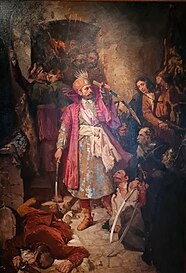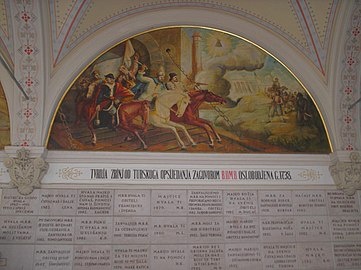Nikola Šubić Zrinski
Nikolaus IV. Šubić von Zrin , Nikolaus Šubić Zrinski for short ( Croatian Nikola Šubić Zrinski , Hungarian Zrínyi Miklós ; * around 1508 or 1518 at Zrin Castle ; † September 8, 1566 in Szigetvár , Hungary ) was a count from the Croatian - Hungarian noble family Zrinski . He was the Ban of Croatia from 1542 to 1556 . Zrinski was the general of the Roman-German Emperor Ferdinand I and is considered a hero of the siege of Szigetvár .
Life
Zrinski came from the old Croatian family of Šubić , who called themselves counts "von Zrin" after the Zrin castle since 1347 . He was the son of Nikola III. Zrinski and the half-Hungarian Jelena Karlović from Krbava (Corbavia).
He distinguished himself at the first Turkish siege of Vienna in 1529. Hans Katzianer , commander Ferdinand I accused of high treason, evaded the charge by fleeing to Kostajnica Castle . He wanted to persuade Nikola and his older brother Johann to join the Ottomans , but was murdered by Nikola on October 27, 1539.

Zrinski saved the imperial army from defeat at Pest in 1542 by intervening with 400 Croatians. In the same year he became a Ban of Croatia and Slavonia . For his services Ferdinand I gave him the county Međimurje in northern Croatia with the castle Čakovec .
In 1543 Zrinski married the young Katarina Frankopan , daughter of Christoph Frankopan , former Ban of Croatia. She bore him many children, including his successor Georg and Juraj IV. Zrinski .
He put the Turks to flight at Somlyó near Stuhlweissenburg .
In 1554 Emperor Ferdinand I of Habsburg , King of Hungary, formally elevated him to the rank of count .
1556 he was the siege of Szigetvár ( County Baranja stop in southern Hungary) by the Ottomans in by collaboration with Palatin Thomas III. Nádasdy attacked the city of Babócsa .
In 1557 he abdicated as a ban and became the commandant of Szigetvár. In 1561 he was promoted to royal tavernicus (treasurer) in Hungary, two years later he was appointed commander in chief of the royal troops on the right bank of the Danube . After the death of his first wife, he married Eva von Rosenberg in 1564 , a sister of the brothers Wilhelm and Peter Wok von Rosenberg , with whom he had the son Johann Zrinski von Seryn († 1612). Shortly after the wedding he had to hurry south, where he defeated the Turks at Segesd .
After the death of Emperor Ferdinand I, he pleaded under his successor Maximilian II for a suspension of tribute payments to the Ottoman Empire. Sultan Suleyman the Magnificent wanted to punish Zrinski for this and began on August 6, 1566 with the siege of Szigetvár . On the night of September 5 to 6, Suleyman died of old age, an event that Zrinski could not use to his advantage. Before the fall of the fortress, he undertook a sortie with the remaining soldiers on September 8, in which almost all of the defenders were killed. Zrinski was taken prisoner seriously wounded and beheaded. His head was placed on a pole in the Ottoman camp, then sent to the imperial family and taken to Čakovec in the monastery of St. Helena buried.
According to reports, in a speech addressed to his brothers in arms shortly before the outbreak, Zrinski said: “We are going from this burning place openly and steadfastly to our enemies. Whoever dies will be with God. Who does not die - his name will be honored. I'll go first and what I do you will do. And God is my witness that I have never left you, my brothers and knights! "
progeny
Zrinski's great-grandchildren were the Croatian Ban and Croatian-Hungarian poet Nikola Zrínski and the Croatian Ban and writer Petar Zrinski .
reception

|

|
|
|
Nikola Šubić Zrinski in the Feldherrenhalle of the Military History Museum, Vienna
|
Depiction of Zrinski's heroic death in Sziget by Alfons Mucha , from his " Slav Epic " (1914)
|
The German writer Theodor Körner wrote the drama Zriny on him in 1812 , after which August von Adelburg wrote the libretto for his opera Zrinyi . The Croatian composer Ivan Zajc created an opera called Nikola Šubić-Zrinjski , which premiered in November 1876. It is a patriotic work that deals with the heroic struggle of the Croats against the Turks and the betrayal by the Habsburg monarchy. It is still performed regularly today.
Through the imperial resolution of Franz Joseph I on February 28, 1863, Zrinski was added to the list of the "most famous warlords and generals of Austria worthy of perpetual emulation" , in whose honor and memory there was also a life-size statue in the general hall of the then newly erected kk Hofwaffenmuseums (today: Heeresgeschichtliches Museum Wien ) was built. The statue was created in 1865 by the sculptor Nikolaus Vay (1828–1886) from Carrara marble and was dedicated by Emperor Franz Joseph himself.
In 1914, the Czech painter Alfons Mucha (1860–1939) dedicated the picture to Zrinski with the title “The victim of the Croatian Ban Nikolas Zrinsky in Sziget” from the painting cycle “ The Slav Epic ”.
Others

The Zrinjevac Park is named after him in the center of Zagreb .
In 1869, the Zrinskigasse in Vienna's Brigittenau (20th district) was named after him.
- gallery
The apotheosis of Zrinski (16th century)
Painting by Oton Iveković
Statue in Zrinski Park in Čakovec
The loss of Zrinski as a fresco in the Croatian pilgrimage site of Marija Bistrica
Zrinski's Zischägge
Zrinski's saber and helmet at an exhibition in Čakovec
literature
- Lorenz Wessel : A really nice lament about the occupation and conquest of the fortifications Siget in Vngern, with an indication of how Ritterlich and Mannlich der Gestreng and Wolgeborn Herr and Graff Niclaus von Serin, Rom. Kay. May. & C. General Oberster with his people of war in it and vmb his life is coming, in the month of September 1566 . Jm Thon: Oh God, I thů complain to you of the misery and great need, & c. Or how to sing the song of Olmitz. By Lorentz Wessel from Essen. o. O. 1566 ( digitized version of the Berlin State Library)
- Nicolaus Serinii Comes . In: Jakob Schrenck von Notzing : Augustissimorum imperatorum, serenissimorum regum atque archiducum, illustrissimorum principum, nec non comitum, baronum, nobilium, aliorumque clarissimorum virorum, qui aut ipsi cum imperio bellorum duces fuerunt… verissimae succinctae description, etes… . Johannes Agricola (Baur), Innsbruck 1601, sheet 107 ( digitized in the Internet Archive)
- Oscar Criste: Zrinyi, Nicolaus Graf . In: Allgemeine Deutsche Biographie (ADB). Volume 45, Duncker & Humblot, Leipzig 1900, pp. 441-443.
- Manfred Stoy: Zrinski, Nikola Graf . In: Biographical Lexicon on the History of Southeast Europe . Volume 4. Munich 1981, p. 504
Web links
- Szigetvár (German) ( Memento from January 1, 2007 in the web archive archive.today )
- Short biography with picture
- Nikola Šubić Zrinski's tombstone in the local museum in Čakovec
Individual evidence
- ↑ Libretto of the opera Zrinyi ( digitized version )
- ↑ Johann Christoph Allmayer-Beck : The Army History Museum Vienna. The museum and its representative rooms . Kiesel Verlag, Salzburg 1981, ISBN 3-7023-0113-5 , p. 30
| personal data | |
|---|---|
| SURNAME | Zrinski, Nikola Šubić |
| ALTERNATIVE NAMES | Zrinyi, Nicholas; Zrínyi, Miklós (Hungarian) |
| BRIEF DESCRIPTION | Croatian-Hungarian general and defender of Szigetvár near Pécs |
| DATE OF BIRTH | around 1508 |
| PLACE OF BIRTH | Zrin |
| DATE OF DEATH | September 8, 1566 |
| Place of death | Szigetvár , Hungary |










